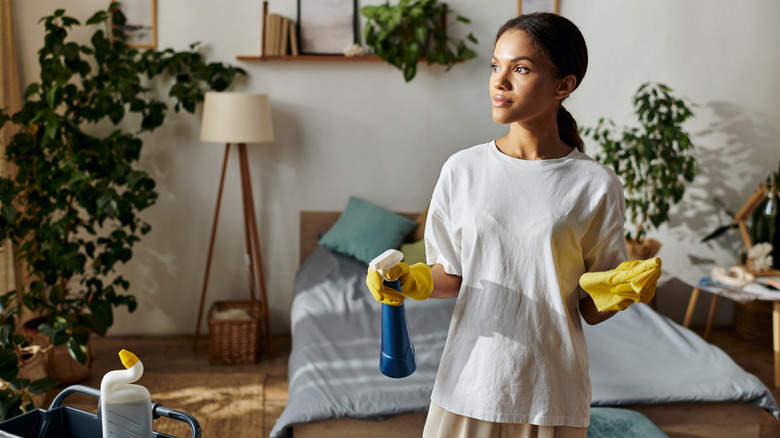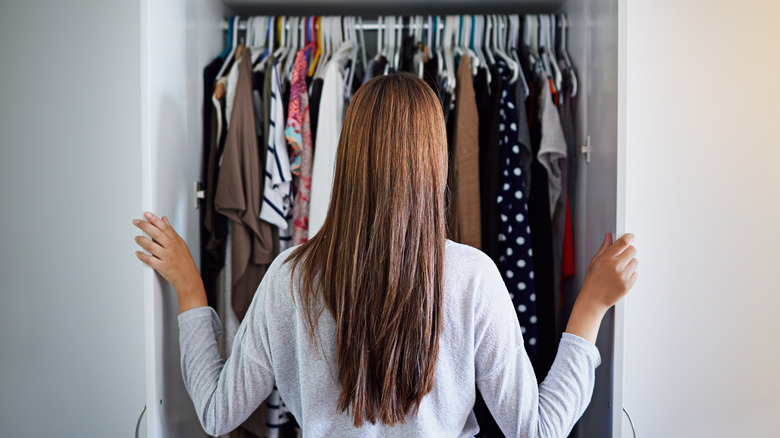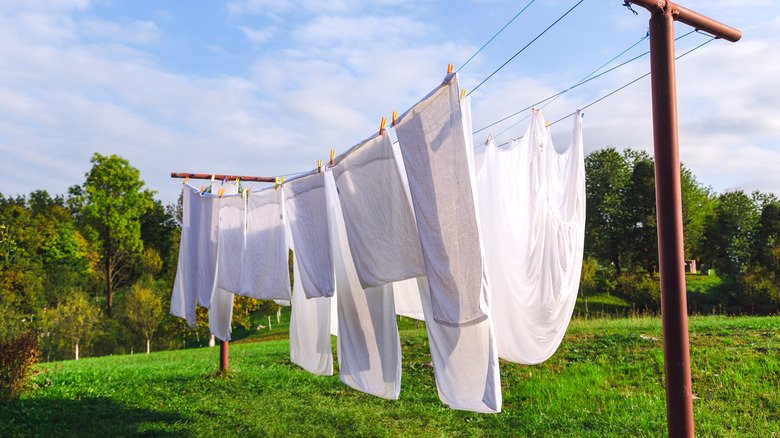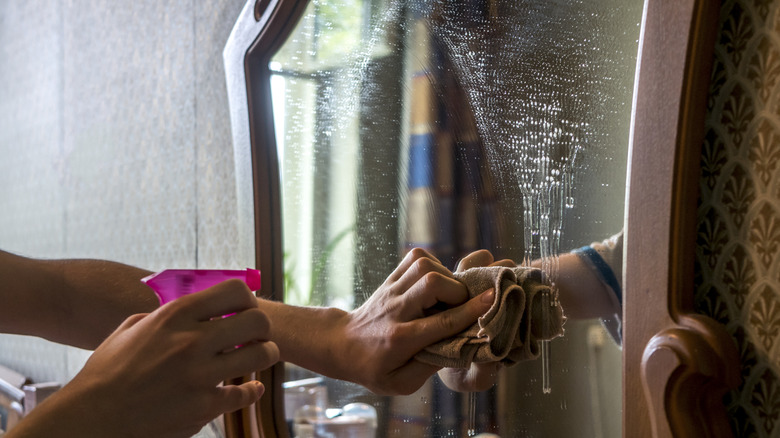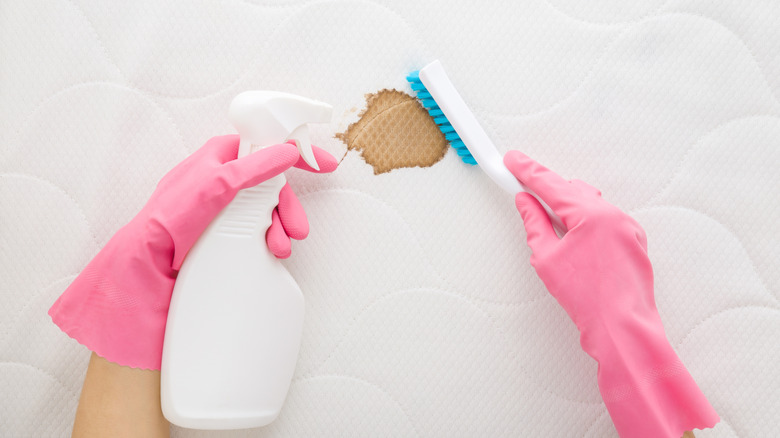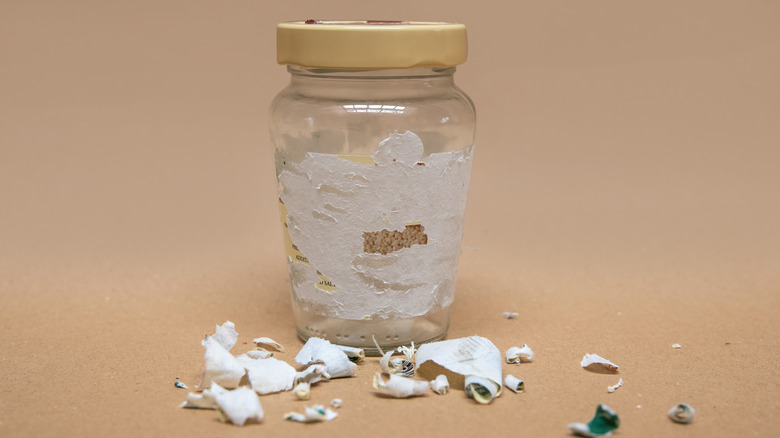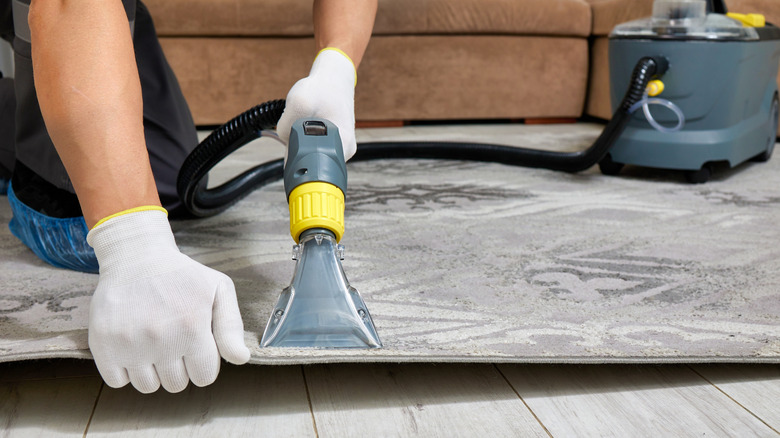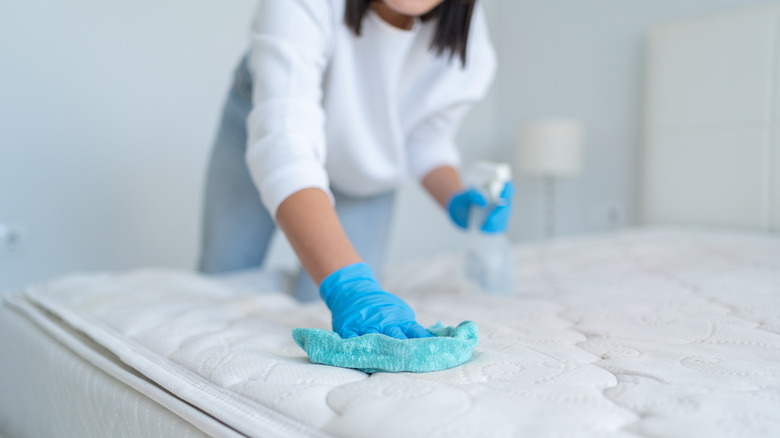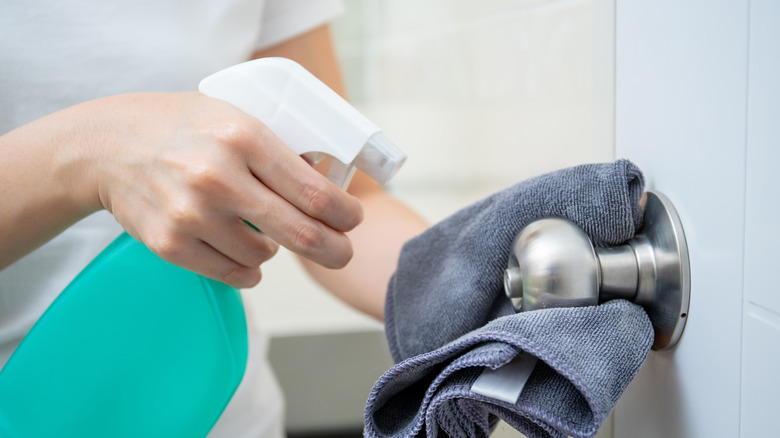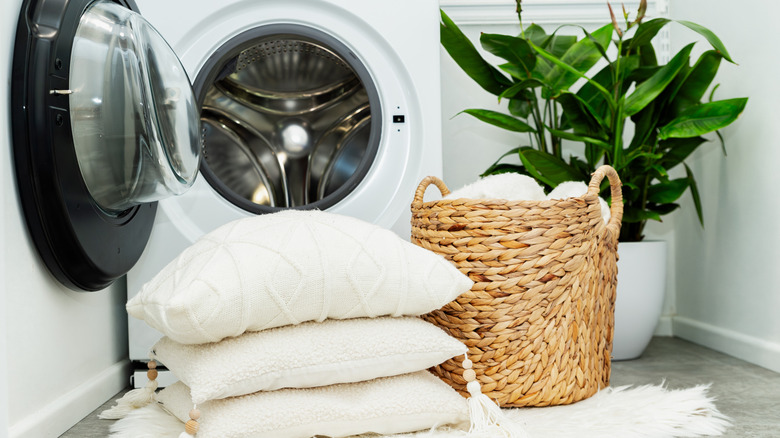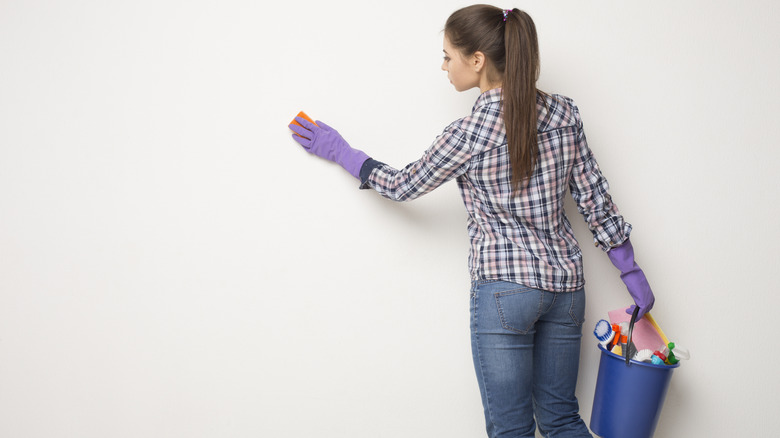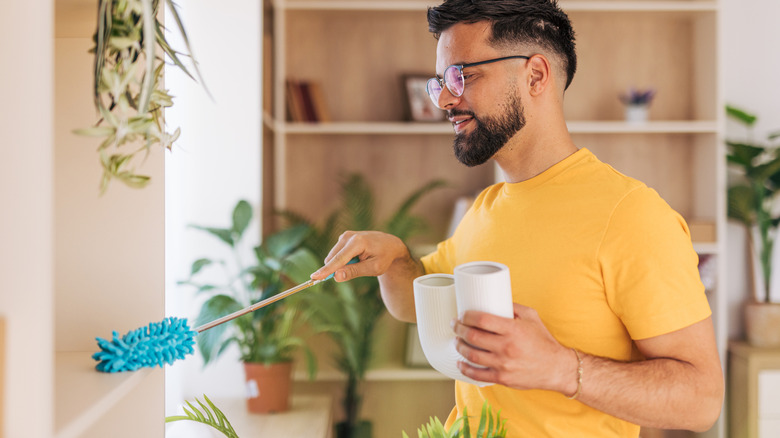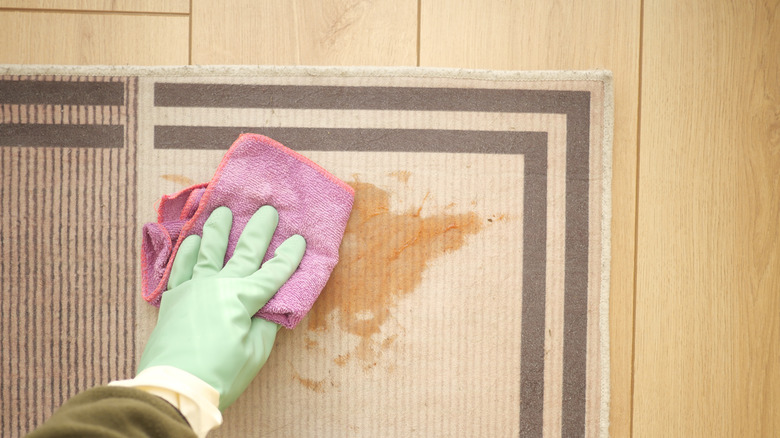How To Clean Your Entire Bedroom With Vinegar, From The Bed To Closet
Few things are better than sliding into your favorite pajamas after a long day. However, the excitement of finally meeting your bed at the end of the day can quickly fade once you realize, yes, your bedroom is clean and tidy, but something feels...stale. Lingering odors, stains, and dust may not be the most obvious of messes in your room, but they can make your bedroom smell (and feel) heavy. As a result, you may find yourself on the hunt for the perfect cleaner — and it just so happens to be hiding in your pantry.
Thanks to its acidity, vinegar can be used for everything from lifting stains to tackling grime to cutting down on the number of nasty germs haunting the high-traffic spots of your bedroom. It's also relatively inexpensive compared to some other options, as well as easy to use. Plus, because vinegar is such a versatile cleaning tool, you can use it to knock out several spots in your bedroom, making it a go-to multipurpose cleaner if you're looking for something to freshen up your personal retreat.
However, vinegar's acidic nature can also lead to staining or even damage. As a result, it's important to learn if vinegar is safe for the material you want to clean, like certain types of floorings. You may also want to test vinegar in an inconspicuous spot first to check for damage or discoloration that may occur after cleaning. It's also important to avoid mixing vinegar with some chemicals such as bleach.
Deodorize unwanted closet smells
When you're only storing clean clothes, a musty or unpleasant closest smell can be puzzling. However, even something as simple as poor ventilation can leave your closest smelling and feeling stale. Fortunately, getting rid of that odor doesn't have to be difficult. The chemical molecules in vinegar can bond with and break down the compounds causing those smells, eliminating the odor at its source. To remove musty closet smells, fill a bowl halfway with vinegar and then leave it in your closet with the door shut. You can remove the bowl when the odors are gone.
Whiten sheets
Your sheets go through a lot, especially if you're getting eight hours of sleep each night. As a result, you may find that your white sheets have picked up stains from sweat, lotions, or even spills. Before you reach for the bleach in your next laundry load, however, consider using vinegar in your laundry to restore and whiten your sheets. Just like how vinegar's acidic nature can target smells in your bedroom, it can also help lift stains and whiten fabrics. Make sure to research your specific sheet's material before adding it in, as some fabrics may be stained by vinegar.
Wipe down your mirrors
Is your bedroom mirror looking a little under the weather? Few things can dampen your spirits like trying on the amazing new outfit you bought just to find that you can hardly see yourself in the mirror. While there are dozens of different products you can purchase for the sole intention of cleaning your bedroom's mirrors, you can also use a diluted vinegar solution. Simply mix white vinegar and water in a 1:4 ratio into a spray bottle, adding just a drop of dish soap for tougher grime, and clean your mirror as normal.
Spot clean mattress stains
Spilled tea or coffee, leftover residue from lotion, even sweat or restroom accidents — there are many common types of mattress stains. While some types of stains may not respond well to vinegar, this pantry staple can be helpful for targeting deep, set-in stains. However, be careful if you're targeting a stain left behind due to a pet's accident, as vinegar's scent may cause your pet to mark the area again, leading to another mess to clean.
Remove stubborn stickers
Upcycling is a great way to cut down on waste, and that glass jar you just emptied could be the perfect material for your next DIY — except for that stubborn sticker that you can't scrape off. Vinegar is just one example of a common household ingredient that can remove stickers and residue, and it's easy to use. All you have to do is soak a cotton ball or paper towel in your vinegar and allow it to sit on the sticker for a few minutes. This can help loosen the residue for an easier removal.
Clean your bedroom carpet (or rug)
If you've ever cleaned your carpet with a soap and water solution before, you may have found that the aftermath left the material feeling tacky or soapy, even after washing the solution away. To help cut through the residue that soap can leave behind while also reducing the likelihood of mold forming, you can rinse your carpet with vinegar afterwards. However, just like with other fabrics and materials, make sure to research beforehand to avoid staining.
Maintain your mattress
So we know that vinegar can be used to spot clean mattress stains. However, it's also useful for simply keeping your mattress clean and smelling fresh. First, create a diluted vinegar solution, then add it to a spray bottle. By lightly spraying this solution over your mattress, you can reduce the amount of bacteria while also cleaning any dust or dust mites that may be causing your mattress to smell stale or musty. If you're worried about a strong vinegar scent, try to avoid saturating your mattress so the solution can dry quickly without being too pungent.
Clean high-traffic areas
On the topic of reducing the amount of germs in your bedroom, you can also use vinegar to clean those high-traffic areas around your room. Vinegar isn't an EPA-registered disinfectant, and it often isn't enough to eliminate all bacteria or viruses on a surface. As a result, if you're worried about catching or spreading illnesses on surfaces in your bedroom, you may want to reach for another option designed for complete disinfection. However, vinegar can help eliminate some surface germs, which makes it great for quickly wiping down areas like door knobs.
Soften bedding
It's that time of the week to strip your bed and start up a load of laundry. However, instead of reaching for your favorite fabric softener, you may want to consider using vinegar here as well. Alongside whitening your sheets and removing odors, vinegar can help soften your blankets and bedding by reducing detergent buildup. Just remember that not all materials are safe to be washed with vinegar, and using vinegar in every wash could lead to complications with your washing machine.
Freshen walls
In many cases, a simple bucket of soapy water will do for washing your walls. However, if you're looking to remove any stubborn stains that just won't budge with your go-to dish soap concoction, then you may want to try using diluted vinegar. While you do need to be cautious depending on the type of material and paint on your walls, adding a splash of vinegar to your soapy water can help with those hard-to-clean areas. Be careful not to soak or oversaturate your walls while cleaning, though. A light spritz is often enough to do the trick.
Tackle dust
If you feel like you need a stronger approach to dusting than plain water or a dry cloth alone, a diluted vinegar solution may be the perfect way to clean up any shelving or dust-prone areas in your bedroom. It's also easy to make, just requiring vinegar and water in a spray bottle. Depending on your goals, you may also want to add essential oils for fragrance or olive oil. To use, simply spray your solution onto a vinegar-safe surface and wipe away with a microfiber cloth. This can be helpful if there's grime making dusting difficult.
Erase carpet stains
Remember how vinegar could help remove stains from your mattress? It can also help spot clean stains on your carpets or rugs as well, so long as they're made of a material that's safe to use vinegar on. There is a caveat, however: Vinegar shouldn't be used on protein-based stains, like blood. Instead, stick to vinegar for removing tannin-based stains, like the drops of coffee you may have accidentally spilled while getting ready.
